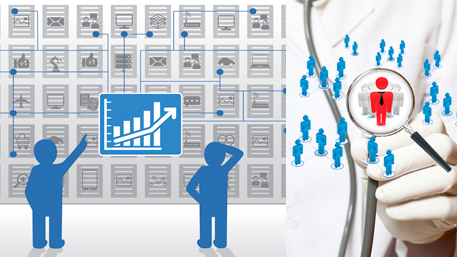
AI’s Next Frontier: Predictive Analytics for Precision MedicineAI’s Next Frontier: Predictive Analytics for Precision Medicine Artificial intelligence (AI) is rapidly transforming healthcare, with predictive analytics emerging as a powerful tool for precision medicine. By analyzing vast amounts of data, AI algorithms can identify patterns and predict disease risk, disease progression, and treatment outcomes, enabling personalized healthcare tailored to each patient’s unique needs. Predicting Disease Risk AI can analyze genetic, lifestyle, and environmental data to assess an individual’s risk of developing specific diseases. This information can then be used for preventive measures or early intervention, potentially improving health outcomes and reducing healthcare costs. For example, AI algorithms have been developed to predict the risk of breast cancer based on genetic markers, allowing women to make informed decisions about screening and treatment options. Forecasting Disease Progression Once a disease has been diagnosed, AI can help predict its progression and identify patients at high risk for complications. By analyzing medical records, imaging data, and other relevant information, AI algorithms can estimate the likelihood of disease progression, duration of symptoms, and need for additional treatments. This information can guide treatment decisions and improve patient care through personalized management plans. Optimizing Treatment Outcomes AI can also assist in optimizing treatment outcomes by predicting the effectiveness of different medications and therapies for each patient. By analyzing patient data and treatment history, AI algorithms can identify the most appropriate treatments and dosages, reducing the risk of adverse effects and improving chances of successful outcomes. For instance, AI is being used to predict the efficacy of chemotherapy regimens for cancer patients, allowing doctors to tailor treatment plans to maximize response rates. Personalized Dosing AI can help determine the optimal dosage of medications for each patient, taking into account their age, weight, genetic makeup, and other factors. This personalized dosing approach ensures that patients receive the most effective dose while minimizing the risk of side effects. For example, AI algorithms have been developed to calculate personalized dosing for opioids, reducing the risk of overdosing and improving pain management. Challenges and Future Directions Despite the immense potential of AI in precision medicine, there are challenges to overcome. Data privacy and security, algorithmic bias, and regulatory approvals need to be addressed to ensure the safe and ethical use of AI in healthcare. Future research should focus on developing more accurate and interpretable AI models, integrating multi-modal data sources, and integrating AI into clinical workflow to maximize its impact on patient outcomes. Conclusion AI’s next frontier lies in predictive analytics for precision medicine. By analyzing vast amounts of data, AI algorithms can predict disease risk, progression, and treatment outcomes, enabling personalized healthcare that is tailored to each patient’s unique needs. As AI continues to evolve, it has the potential to revolutionize healthcare delivery, improve health outcomes, and reduce healthcare costs, transforming the way we prevent, diagnose, and treat diseases.
Posted inNews